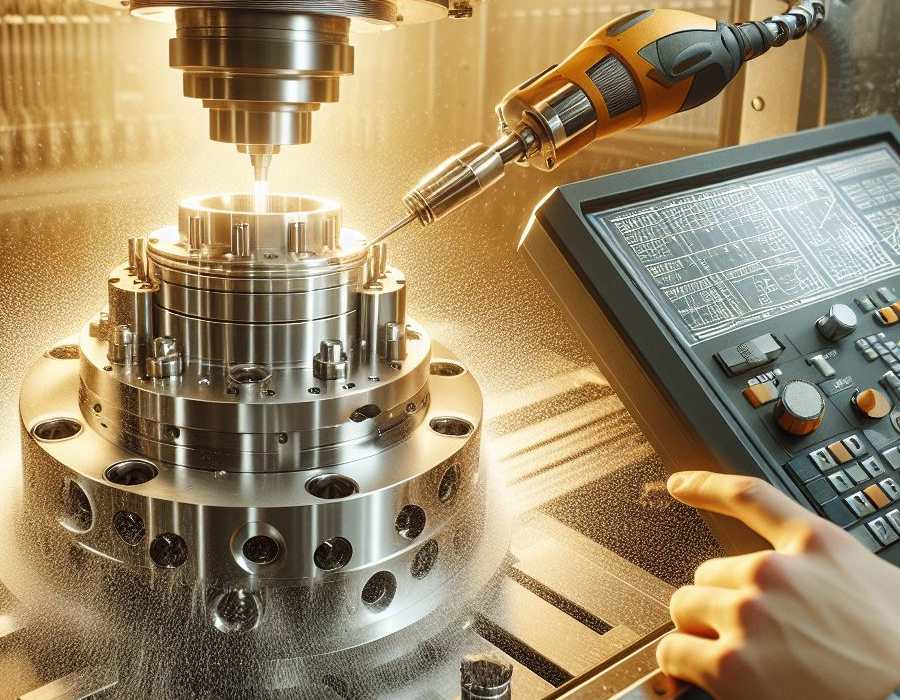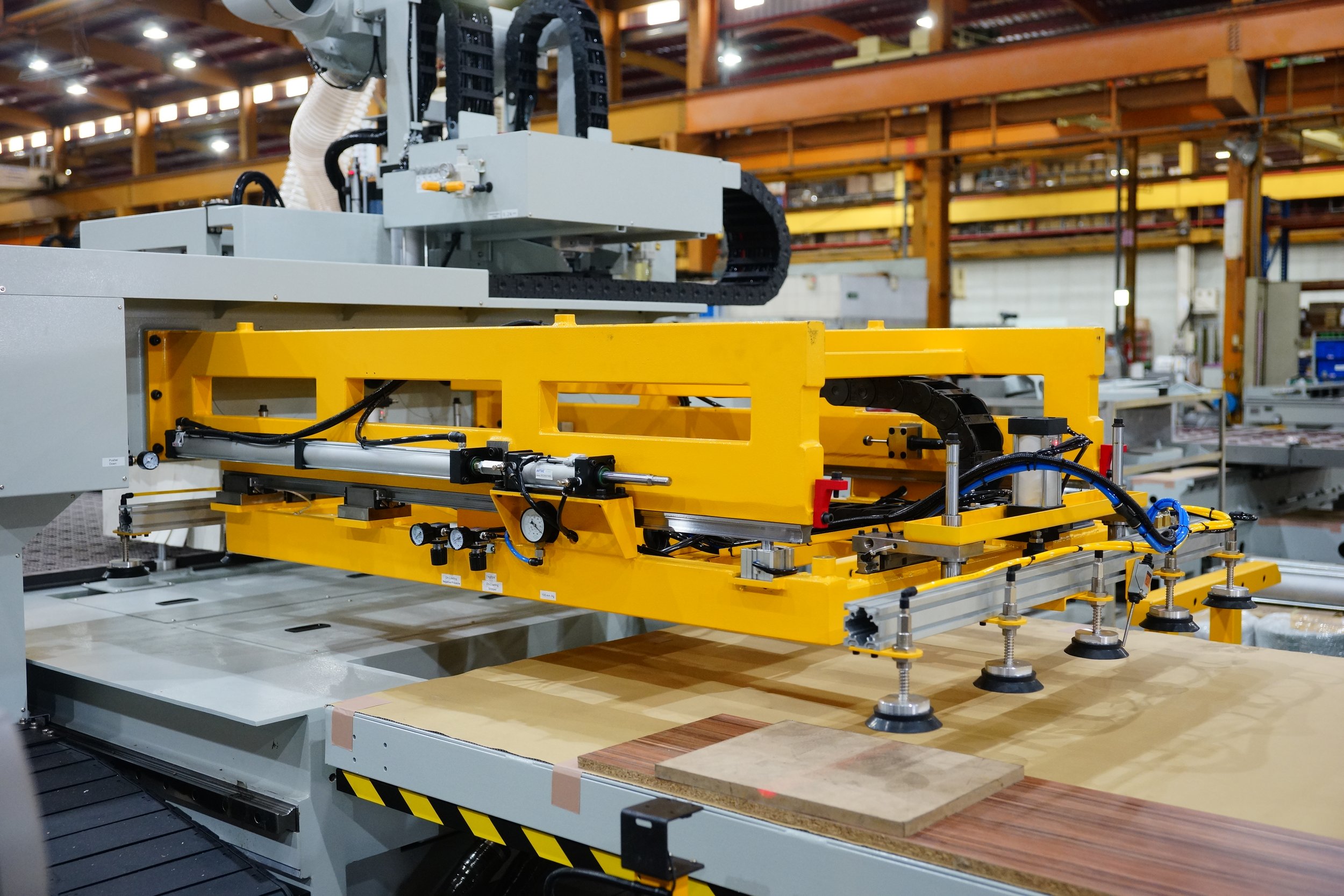Top 7 benefits of using cnc turning service for production runs
Exactly How CNC Machining Providers Enhance Effectiveness in Milling and Transforming Procedures
CNC machining solutions play an essential function in improving efficiency within milling and turning procedures. By using automation and precise control, these solutions lessen human mistake and warranty consistent result. The capability to take care of complicated geometries and maintain tight resistances enhances manufacturing. The complete extent of CNC modern technology's impact goes beyond standard efficiency gains. There are deeper effects and future trends that call for more exploration.
The Fundamentals of CNC Machining
CNC machining is a precise manufacturing procedure that makes use of computer-controlled devices to create complex components and components. This innovation utilizes computer-aided layout (CAD) software to create in-depth versions, which are after that translated into device directions. The procedure typically includes different procedures such as milling, transforming, and boring, making it possible for manufacturers to achieve high levels of accuracy and repeatability.
CNC devices are geared up with sophisticated tooling that can control materials like plastic, metal, and wood. They run via a collection of commands that determine motions, speeds, and tool changes, reducing human error and enhancing manufacturing performance.
The automation integral in CNC machining permits intricate geometries and limited tolerances to be constantly created, making it a favored choice in industries calling for accuracy, such as aerospace and vehicle. Comprehending the fundamentals of CNC machining is important for valuing its function in contemporary manufacturing procedures.
Advantages of CNC Machining in Milling
CNC machining provides significant benefits in milling processes, particularly pertaining to accuracy and accuracy. This modern technology not only enhances manufacturing speed yet likewise enables the production of complicated layouts that would be challenging to accomplish manually. Because of this, companies can boost effectiveness and broaden their abilities in manufacturing.
Precision and Accuracy
Attaining unmatched precision and precision in milling processes is a characteristic of advanced machining strategies. CNC machining services use computer-controlled systems that meticulously carry out designs with very little human treatment. This automation guarantees that each cut and shape is performed to precise requirements, significantly lowering the risk of errors typically related to hand-operated milling. The capability to create detailed geometries with tight tolerances is a vital advantage, allowing manufacturers to meet rigid top quality requirements. Additionally, CNC makers can keep regular performance across several runs, ensuring harmony in manufacturing. This degree of accuracy not just enhances product high quality yet also reduces material waste, causing more effective use of sources. On the whole, CNC machining solutions revolutionize milling processes through their commitment to accuracy and detail.
Boosted Manufacturing Rate
Increasing manufacturing speed is one of the standout benefits of modern-day machining solutions. CNC machining greatly decreases the time required for grating processes by automating operations and lessening hand-operated treatment. Machines can operate continuously, enabling for boosted outcome without giving up quality. The capacity to program numerous tasks into a solitary configuration additionally enhances production, enabling manufacturers to complete complex jobs in less time. Additionally, CNC equipments preserve high-speed cutting capacities, leading to quicker material elimination and faster cycle times. This improved efficiency translates to shorter preparations, making it possible for business to respond quickly to market needs. On the whole, raised production speed with CNC machining not only boosts productivity yet additionally enhances competitive advantage in the manufacturing market.
Complex Style Capabilities
The capability to create complex designs is a substantial advantage of contemporary machining solutions. CNC machining enables the manufacturing of complex geometries that would be tough, if not difficult, to achieve utilizing traditional techniques. This capacity stems from sophisticated programs and automated devices that precisely comply with electronic blueprints, making sure precision and repeatability. Because of this, makers can generate intricate get rid of tight resistances, maximizing performance in various applications. In addition, the adaptability of CNC devices makes it possible for quick adjustments to design specs without substantial retooling, simplifying the manufacturing procedure. This adaptability not only enhances creativity in design but likewise enables efficient experimentation and development, providing companies a competitive edge in the ever-evolving market.

Advantages of CNC Transforming Processes
CNC transforming processes use significant benefits in production, especially pertaining to precision and precision. These processes enable the creation of extremely described components with very little resistances, ensuring high quality in manufacturing. Additionally, the effectiveness of CNC transforming adds to reduced lead times, making it possible for faster shipment of completed items.
Precision and Accuracy
Precision and accuracy are hallmark qualities of CNC transforming procedures, establishing them apart in the production landscape. These processes utilize computer numerical control to assist reducing devices with unmatched exactness. This results in elements that satisfy rigid requirements and resistances, reducing the likelihood of errors. CNC turning enables repeatable and constant manufacturing, making certain that each component is virtually identical, which is vital in industries requiring high standards, such as aerospace and clinical tools - tool and die maker. Additionally, advanced software and technology enable real-time adjustments during machining, boosting total high quality. useful reference By lessening human error and optimizing control over the manufacturing procedure, CNC transforming services deliver superior accuracy and precision, making them a necessary option for modern production demands
Minimized Lead Times
Decreased lead times are a substantial benefit of CNC turning procedures, coming from their ability to automate and optimize production. CNC transforming makers operate with high performance, permitting for fast setup and implementation of several tasks without the demand for substantial manual treatment. This automation reduces downtime and accelerates the production process, making it possible for quicker turnaround for orders. In addition, CNC innovation enhances consistency and reduces mistakes, which better adds to faster manufacturing cycles. Therefore, organizations can meet limited target dates and respond immediately to market demands. By leveraging CNC turning procedures, firms can improve browse around these guys process, boost resource allowance, and inevitably enhance their one-upmanship via reduced lead times.
Precision and Accuracy in Production
While making processes have progressed substantially over the years, the importance of accuracy and precision continues to be critical. In CNC machining, these two aspects are essential to producing premium parts that meet exact specifications. The combination of sophisticated computer innovation enables thorough control over machining criteria, making certain that components are crafted with marginal deviation from intended designs.
Accuracy in making refers to the repeatability of processes, while accuracy denotes how closely a finished part aligns with its intended dimensions. CNC machines make use of sophisticated software and devices that make it possible for manufacturers to achieve both, visibly lowering the margin for mistake - fast prototyping. This capacity is specifically necessary in markets such as aerospace, automotive, and clinical, where also minor errors can bring about disastrous failures

Decreasing Lead Times With CNC Technology
CNC innovation accelerates manufacturing timelines by streamlining the machining procedure. By automating jobs, CNC equipments decrease hand-operated treatment, considerably decreasing the moment required for setup and operation. This efficiency allows suppliers to react promptly to market demands, satisfying orders much faster than conventional machining techniques enable.
Additionally, CNC technology supplies fast prototyping capabilities, enabling fast iterations and modifications based upon client responses. The precision of CNC machining ensures that components are created correctly the very first time, decreasing the possibility of expensive mistakes and remodel.
Moreover, advanced organizing and shows capacities enhance process, permitting several procedures to run concurrently. This assimilation of technology not just shortens lead times yet additionally improves overall productivity. Inevitably, the adoption of CNC machining services gears up manufacturers with the tools essential to satisfy tight deadlines while maintaining top quality criteria in production.
The Future of CNC Machining in Sector
As manufacturers increasingly adopt CNC technology to improve processes and minimize lead times, the future of CNC machining in industry shows up promising. Technologies such as expert system and machine understanding are readied to transform the capacities of CNC devices, boosting their accuracy and adaptability. These advancements will assist in real-time tracking and predictive maintenance, reducing downtime and optimizing manufacturing performance.
The integration of Web of Things (IoT) modern technologies will enable much better information collection and analysis, enabling makers to make informed decisions that better improve functional efficiency. The increase of additive production alongside CNC machining is anticipated to enhance standard approaches, offering higher layout flexibility and material effectiveness.
Additionally, as sustainability becomes a concern, CNC machining is progressing to include green practices, which will attract ecologically aware customers. On the whole, the future of CNC machining is identified by continuous innovation and adjustment, placing it as a keystone web of modern-day production.
Often Asked Inquiries
What Materials Are Compatible With CNC Machining Providers?
CNC machining services work with different products, including steels like steel, titanium, and aluminum, as well as plastics such as acrylic and polycarbonate. Wood and composites also match CNC processes for varied applications.
Exactly How Does CNC Machining Compare to Typical Machining Techniques?
CNC machining offers greater consistency, automation, and precision compared to typical techniques. It lowers human error, enhances production rate, and permits complex styles, making it a superior selection in modern-day production atmospheres.
What Industries Benefit the A Lot Of From CNC Machining Providers?
The aerospace, auto, clinical, and electronics industries profit substantially from CNC machining solutions. These markets utilize personalization, speed, and accuracy to enhance product quality while lowering production expenses and time, eventually boosting total functional performance.
Can CNC Machines Deal With Complicated Geometries and Layouts?
CNC makers are experienced at dealing with complex geometries and layouts, enabling for precision and detailed describing. Their innovative shows capacities enable producers to create components with high precision, meeting diverse market requirements and enhancing product performance.
What Is the Common Expense Array for CNC Machining Services?
The normal expense range for CNC machining solutions varies commonly, usually falling between $50 to $150 per hour, relying on factors such as material, intricacy, quantity, and the specific machining processes utilized.
CNC machining is an exact production process that utilizes computer-controlled makers to generate intricate parts and components. CNC machining uses substantial benefits in milling procedures, particularly concerning precision and accuracy. CNC machining considerably lowers the time needed for milling processes by automating operations and minimizing manual intervention. CNC innovation speeds up production timelines by enhancing the machining procedure. As makers significantly take on CNC modern technology to simplify procedures and lower lead times, the future of CNC machining in sector shows up encouraging.